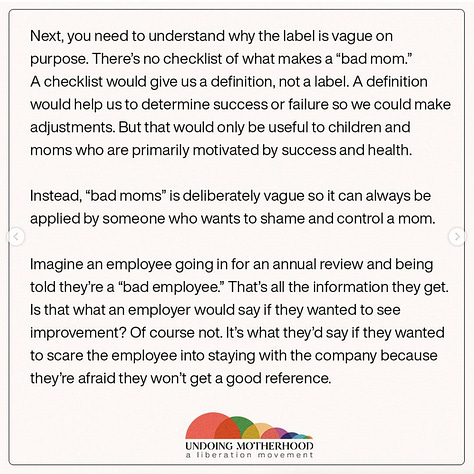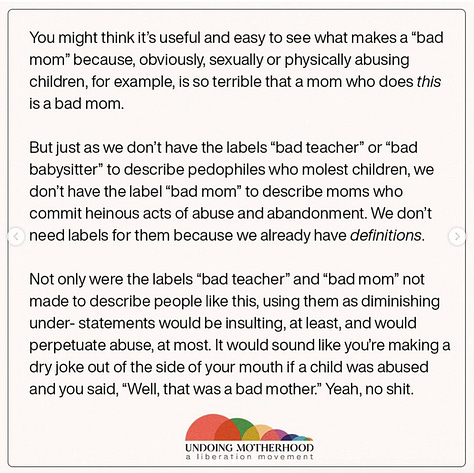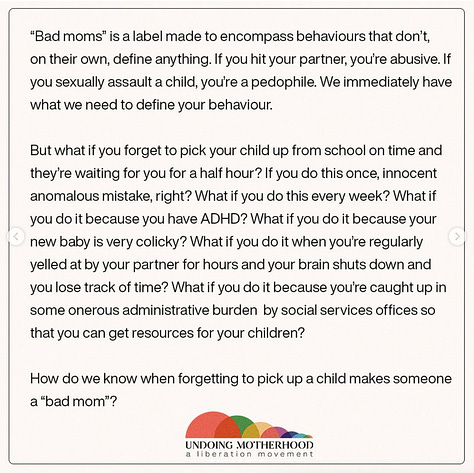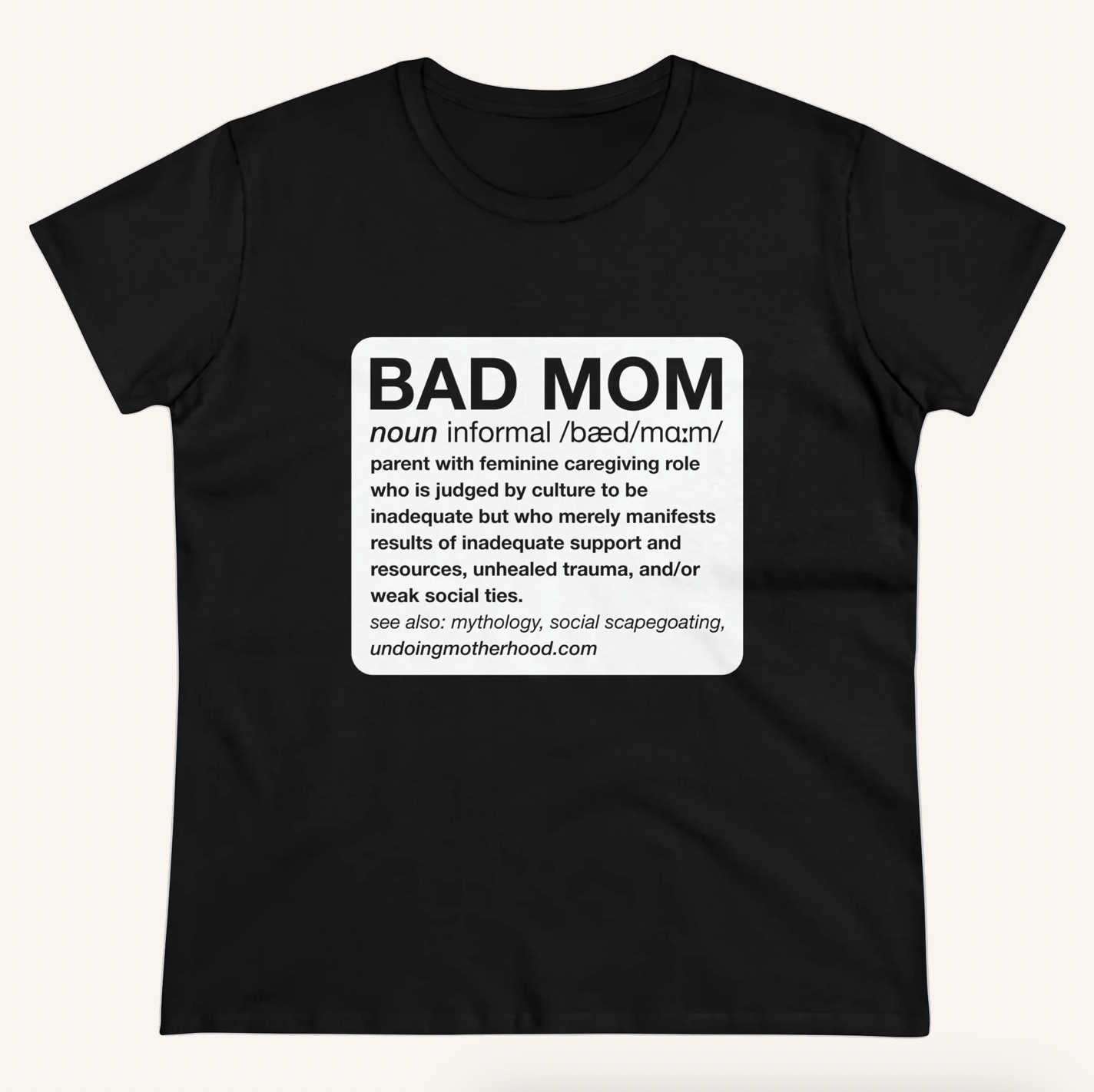Why there's no such thing as a "bad" or "good" mom
And why you've been tricked into using these labels
Let’s say you had a “bad mom.” What does that mean? What do people know when you say that?
Did she beat you? Did she call you cruel names? Did she leave you in dangerous situations? Did she criticize you a little too much, trying to help you correct behaviours that would cause peers to reject you? Was she a bad cook? Was she a messy homemaker? Was she depressed, stuck in the house, never taking you anywhere? Did she fail to encourage your musical talents or interests? Did she fail to volunteer at your school? What, exactly, made her “bad”?
There’s no objective standard for a “good mom” or a “bad mom.” I have heard people describe their moms as “bad moms” for working outside the home, or for divorcing their dad, or for not putting them in music lessons. My standard for “bad” would be someone so unsafe that the children should be put in the care of other caregivers.
All anyone knows, really, when you use this phrase is that you felt let down by your mom. And, sure, maybe that’s all you need to communicate. Maybe you’re using this as a short hand, as a placeholder, welcoming questions so you can get more specific.
So then my next question is whether you want understanding for your life experience or whether you want a validating audience for your condemnation of your mother. Maybe it’s a little of both?
If you’re wanting to communicate something about your childhood, “I had a bad mom” is not the ticket. It means too many things. A “bad mom” in the eyes of a fundamentalist Christian daughter might be a feminist anarchist’s awesome mom. It’s too subjective.
Here are some snippets of an Instagram post about the “bad mom” label. (If you click on them, you can enlarge them to read.)



I believe “bad mom” exists and persists as a vague catchall to loom as an ever-present threat. There’s no definition, it’s a label. Especially in a culture where being a “bad woman” is no longer so threatening (because gender diversity offers women multiple choices for “womaning,” including being a masculine woman), being a “bad mom” is the ultimate moral failure. We collectively believe mothers to be good animals who self-sacrifice for their young no matter what. Anything else is unnatural: broken or evil.
As a culture becomes more gender-equitable, moralizing motherhood increases. We all agree that “good mothers” are good and necessary. If men who want to control the government and economy and hoard power find they’re losing footing, they need to force mothers into motherhood. We can see this happening in the US with the Republican Party. Intersectional feminism spread throughout pop culture through social media so successfully that young teenagers have, in the past decade, developed a vocabulary that used to be relegated to academic spaces! Younger generations are questioning all stratification of humans—class stratification, race, gender, sexuality, ability, and more.
You don’t have to be an academic to learn about feminism. You don’t have to stumble your way into feminism after fifteen years in the workforce break your spirit, forcing you to admit that maybe there really is something to this whole sexism thing. You don’t even have to read a book. All you need to be is about 10-13 and on TikTok and you’ll start to learn some feminist theory. It’s in our music, it’s in teen-driven entertainment, it’s the theory that drove cancel culture and everyone knows and has an opinion about cancel culture. Feminism has, in a sense, won.
Motherhood is the most effective tool of the patriarchy to beat feminism back down into the shadows. Patriarchy needs us busy and exhausted—too distracted by other priorities to lead, protest, or ideate.
“Bad mom” and “good mom” are labels that provoke fear and hustle in women. After we put so much work and love into our children, the worst life outcome we can imagine is our children failing to love us because they say we were “Bad Mom.”
The patriarchy knows that if they can get women pregnant, these hungry labels will take over, working on women’s natural love for their children. Even if mothers are able to recognize controlling propaganda for what it is, even if they’re able to resist social shaming, they still love their children. They’re still vulnerable to hearing messages about “good moms” and wanting to be whatever that is for their children’s sake. Motherhood easily becomes the Trojan Horse for Patriarchy.
If we were to create knowable metrics for what’s required to be a “good mom,” that wouldn’t serve patriarchy because it doesn’t want women actually checking off tasks and accomplishments and then relaxing! Anxiety and competition would disappear if we could know what constitutes “good enough” by everyone’s agreement! What would then wear us down, destroy our health, and cause us to surrender any power and influence we’ve held?
When you use the terms “good mom” and “bad mom,” you’re like a pawn for the patriarchy, keeping these nebulous concepts alive and letting them grow in power.
But that’s not all!
They’re not just vague goalposts. They’re total bullshit to begin with!
Yes, some mothers didn’t meet their children's needs well enough. My mom was one of them. But why?
When people conclude that “bad moms” must not love their children enough or else they’d have done a better job meeting their children’s needs, they’re employing what I’d like to coin as the SuperMom logical fallacy.
SuperMom is supernatural. Her love for her children is god-like. In an emergency, she’s been known to gather enough strength to lift a car off her pinned child. In an emergency, she will run into a burning building or leap through lanes of traffic to get to her child, without a single concern for her own well-being. Like many myths, she’s based in some truth. But myths evolve like a game of Whisper Telephone, as they’re passed from generation to generation or culture to culture or person to person. They pick up new stories and new logics. Myths are there to do whatever we need them to do.
SuperMom has become everyday. She no longer appears in times of emergency. She’s the new average! Her love remains supernatural in quality, but it’s also the default love state for all mothers. The logic goes like this: If SuperMom can lift a car off of a child, surely she can make supper? Surely, she can make supper starting in the morning via crockpot, then volunteer on that class trip, stop by the office and work through lunch to make up for the school volunteering, swing by the market on the way home to dress up supper with some healthy salad greens, engage her children in emotionally satisfying and intellectually stimulating conversation while she makes salad, rally them after dinner to do their chores and homework, tuck them into bed with individualized tender expressions of adoration and assurances that she’ll always be their number one fan no matter what they do and still manage to have them feel special and particular even though she’s just communicated that her love is based less on who the child is and more on their relationship, then make passionate love to her husband, squeeze in some lunges and push-ups before bed, prepare her fashionable-but-modest outfit for the next day’s work, floss and complete a thorough skincare routine, and read some of the latest Canada Reads or Oprah’s book club novel before bed. And she’ll repeat this every day. Because it’s made easy by the power of her supernatural love.
To not love one’s child enough is the greatest sin of humankind. Abraham was called to sacrifice his child Isaac as the ultimate test of faith to the biblical God. Sophie, the mother in Sophie’s Choice was told by Nazis to choose which of her children would be gassed to death and which child would live, or else both would die. It’s seen to be an impossible choice because a Good Mother loves her children equally and more than she loves herself. Maternal love is the animal love that fuels our forward motion. It’s why we’re here and why we evolve.
A mother who does not love their child is like the boogeyman. It’s an idea that haunts us. A lack of parental love, especially maternal love, is the fear that drives many people to take up careers and lives they don’t want, because they believe if their parents aren’t proud of them, then they’ll not love them enough. Or, it’s what drives them to hurt their parent, to test their parent’s love: Are they still wanted?
And like we do with all fears, we look for evidence for it. We commit the Texas Sharp-shooter Fallacy, looking for patterns and disregarding anything that doesn’t fit into the pattern we already imagine exists. Or, we use confirmation bias: we start with the conclusion and then look for evidence that proves it.
What if we imagine that almost every mother does love their child deeply? What if we’re certain that’s true? What do we notice when we avert our gaze and let other information make itself visible?
Imagine a mother who didn’t meet her child’s needs but who was herself an orphan child of Auschwitz. We can forgive her easily, can’t we, attributing her poor parenting skills to her trauma and lack of parenting examples? We don’t assume she doesn’t love her child enough. We can recognize her failures but offer some compassion to both the mom and the child for being victims of genocide’s consequences.
Sometimes a mother’s background traumas and deprivations are harder to know. There isn’t one big story; instead, her history is comprised of the absence of things, like a photograph that’s been photoshopped so well you can’t tell what should be in the background— a person walking by, a plastic bag flying through the air, maybe even an entire building only known to people in that area as belonging there. A mother may not even recognize what care and teachings were missing. None of us knows what we don’t know because it has to first exist in our awareness to know that we don’t know it.
Most of what affects a mother is unobservable to an outsider.
If most of the information relevant to us is unknowable, then what are the chances that the one lazy theory of unnatural, unloving mothers is the right one?
It’s so rare in nature for an animal to abandon her children that we know something unusual must have happened within that mother, within the environment or with the baby animal if she walks off, leaving her baby to perish. Sometimes, the baby is born deformed or weak, and for the mother animal to stay with her baby would sacrifice her own well-being and that of her other babies, so she has to abandon or kill the baby. Or she might have twins but not enough milk to feed two babies, so she leaves one to die. She may even eat the baby to have strength enough to care for her other babies. Sometimes, she doesn’t know how to mother because domestication deprived her of enough exposure to modelling from other animals. She might not have spent enough time with her own mother to have the memory inside her of what to do with her babies.
It’s tempting to argue that animals offer poor comparison to humans because they don’t really “love” their offspring so much as they feel compelled to nurture them to keep the species going. But there does seem to be evidence that it’s more than that, that animals do feel great affection and attachment for their offspring. And yet, they sometimes act in ways that appear as “bad mothering.”
Animals produce common and predictable patterns because their environments are simpler than ours. If we can always point to something anomalous and measurable when an animal mom abandons her babies, that tells us there’s something pre-programmed into animals that makes them love their children. It’s a given, a drive, a compulsion. When they abandon their appointment as moms, we know there’s a good explanation that can be found in nature.
Just as there are always explanations in nature with animals, there are explanations with humans. It’s harder to see such obvious patterns to explain why moms behave so differently, but the lives of two women can differ more dramatically than those of two entirely different animal species!
Did the mom have a good mom when she was a baby? Was she raised around other animals who showed her how to parent a baby? Does she have the physical energy required to care for all her babies? Does she have enough food? Is something unusual and threatening happening in her environment? Does the baby require extra care beyond her capacity? Is she being abused by her partner? Does she have an outsized amount of responsibilities? Does she feel secure in her employment? Is she worried about her heart or a cancer risk? Is she mourning the loss of parents or other family or friends? Is she under regular attack by an enemy? Is she under regular attack by our entire society, marginalized and targeted? Does she have healthy food to eat to have enough energy? Does she have reliable and safe housing? Is she fulfilled? Does she feel like someone is thinking of her and her needs, that someone has her back? HAS SHE HAD ENOUGH SLEEP? Does she get enough time to rest and recover from life’s demands or is she always worried or strategizing when she’s not working? Is she talented but never has time to exercise her talents? Is she lonely? Has she been assaulted and never had time or resources to heal? Does she have an undiagnosed disability?
This list could go on for pages.
If no one is caring for her, she has to expend a lot of energy to take care of herself. She won’t have enough to give to anyone else, even if she wants to more than anything.
This is why there’s no such thing as “good mothers.” There are only mothers more privileged and mothers more oppressed.
Do you think one whale mama loves her baby more than another whale mama? Do you think a giraffe mom loves her baby more than a cow mom loves her baby? Do you think that if two moms love their children the same, it’s possible for one of them to still care less about her child’s well-being?
Or do you think the inequalities of our lives impact our abilities to put our love and care into action?
When you’re tempted to judge a mother, take a look at the list of questions in that chunky paragraph and ask them of this mother. Who has let this woman down? What is she contending with? Who is caring for her?
Mothers are not gods, angels, or TV characters. We’re only people with high-maintenance bodies, histories of pain, feelings that get hurt, and we experience more existential anxiety and massive hormonal shifts as we reach middle age.
Every person wants to be more than the one who sacrifices their life so that other people can explore their talents and desires. We want experiences, too. We want lives of meaning. We want to die with minimal regrets and we don’t want our children to be sad for us or to feel guilty for all that we weren’t able to experience because we over-prioritized them.
There are no bad moms, just bad systems.






